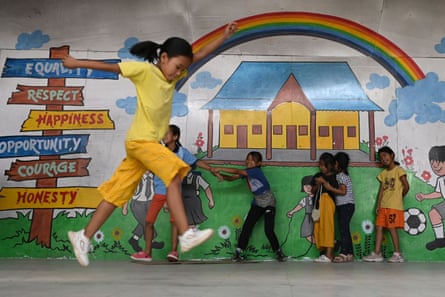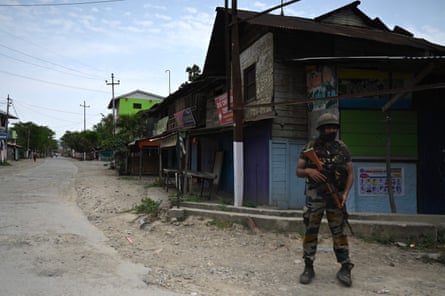In towns and villages across India’s north-eastern state of Manipur, some houses have been reduced to ashes while neighbouring properties stand untouched, after an eruption of ethnic violence in which more than 70 were murdered and 30,000 forced to flee.
The bloodshed which began on 3 May has mostly abated, but there is little hope of a swift return to normality.
Food is scarce; a curfew is still enforced by the army and paramilitary troops; the internet remains suspended; shops, schools and offices are closed; thousands of people remain stranded in crowded and unsanitary refugee camps. And reports of fresh violence over the weekend prompted fresh displacements.
“This is a civil war situation,” said John Mamang, a lawyer and relief volunteer in the town of Churachandpur.
Shortages of food and medicine are becoming acute, said Mamang, who on Monday was unable to even find rice to donate to a nearby camp.
“People are beginning to starve. Some haven’t eaten for two to three days. When I reached the camp, a woman had just delivered a baby, with no medicines or medical help and in the clothes she’d been wearing for five days,” he said.
Most of the victims were from the mainly Christian hill tribes such as the Kukis, but members of the mostly Hindu Meitei people were also targeted.
And in towns where the two communities once lived warily alongside each other, the idea of a return to such uneasy harmony seems unthinkable after so much violence – when friends and neighbours stood by as men, women and children were killed.
“It’s impossible. They can never be our neighbours. Not after what’s happened,” said Alun Singh, a Meitei in Imphal.
Moses Varte, a Kuki in Churachandpur, said “separation is the only answer”, adding “This was ethnic cleansing of the hill people. Now we can only feel safe as a minority if we have our own state.”

Debory Fimsangpui’s home in the region’s capital, Imphal, was burned down by a mob, and she and her family survived only because they happened to be away at the time.
“If we had been there, we would not be alive today. But we will not forget those who died, the elderly, those who could not run away,” said Fimsangpui, a college lecturer.
The fact that Kukis were targeted in the city – despite the presence of security forces – has for many hill tribe members underlined a sense that they cannot be safe anywhere in the state.
“Before, Kukis used to send their children to Imphal for higher studies,” said Fimsangpui. “I have one son, Daleed who is 24. Do you think I would ever send him to Imphal now? We can never trust the Manipur government or the police again.”
The spark for the fuse
The states of north-east India – wedged between Bangladesh, China and Myanmar – are a patchwork of ethnic groups, many of them shot through with longstanding enmities.
The spark for the latest outbreak of violence in Manipur was a plan to grant the majority Meitei the status of a “scheduled tribe” which would give them access to quotas in government jobs and colleges under India’s affirmative action policy.
Tribal leaders say the Meiteis are already better off and dominate the government, police, and civil service. Granting them more privileges would be unfair, the Kukis argue, and would allow the Meiteis access to the forest lands which have been occupied by the tribes for centuries.
“The Meities already have Imphal – which has malls, sports centres and big office buildings – while the hill areas have been neglected and received much less investment. For anything important – social, political, educational or medical treatment – all of us Kukis come to Imphal because it is much more developed than the hill areas.”
Each group blames the other for the violence. Conspiracy theories abound which have furthered weakened what little trust the Kukis had in the government.
Police have been accused of favouring the majority Meitei community. The Kukis evacuated to the safety of army-run camps claimed police did not defend them, or even joined the mobs.
Mamang said: “Hill people have seen policemen in uniform leading some of the mobs and torching whole villages. I was away in Churachandpur for work but my home in Imphal was burnt, with my car, electric scooter, my possessions, all my law books. A friend who tried to stop the mob was almost killed. He managed to run away. The government let the mobs have their way, it was complicit.”

The feeling that there is no going back to an uneasy status quo was reflected in a statement released on Saturday by 10 tribal legislators from the state assembly. They called on New Delhi to create a separate administration for the hill people which could “live peacefully as neighbours with the state of Manipur”. They said that after the carnage, living alongside the Meiteis was “as good as death for our people”.
After a meeting in New Delhi with India’s home minister, Amit Shah, on Sunday, Manipur’s chief minister N Biren Singh told journalists on Monday morning: “The territorial integrity of Manipur [would] be protected at all costs.”
Local people say there is no chance that the small number of Kukis who once lived in Meitei majority areas will ever return – or vice versa.
Before the violence, Fimsangpui was the only Kuki living in her neighbourhood in Imphal. She said that when she heard reports that a Meitei mob had invaded Imphal University, demanding to see students’ ID papers to single out the Kukis, she knew she would never be able to live in the city again. She plans to remain in Churachandpur, Manipur’s second town, which has a predominantly Kuki population.
“The physical separation that’s already there will now become complete segregation. That, I think, will form the basis for a separate hill state,” said Fimsangpui. “We can no longer trust the Manipur government. It does not want to protect us. And we do not want to forget the cries of those who died. We have to keep the memory of them alive.”
(Some names have been changed to protect people’s identities)

